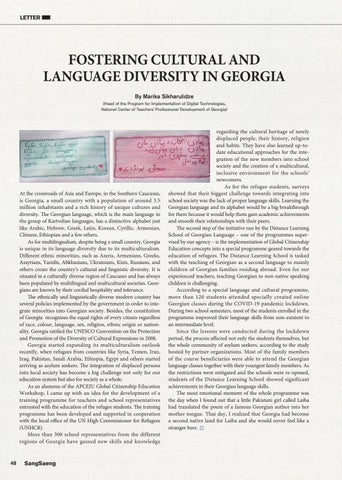LETTER
FOSTERING CULTURAL AND LANGUAGE DIVERSITY IN GEORGIA By Marika Sikharulidze (Head of the Program for Implementation of Digital Technologies, National Center of Teachers’ Professional Development of Georgia)
At the crossroads of Asia and Europe, in the Southern Caucasus, is Georgia, a small country with a population of around 3.5 million inhabitants and a rich history of unique cultures and diversity. The Georgian language, which is the main language in the group of Kartvelian languages, has a distinctive alphabet just like Arabic, Hebrew, Greek, Latin, Korean, Cyrillic, Armenian, Chinese, Ethiopian and a few others. As for multilingualism, despite being a small country, Georgia is unique in its language diversity due to its multiculturalism. Different ethnic minorities, such as Azeris, Armenians, Greeks, Assyrians, Yazidis, Abkhazians, Ukrainians, Kists, Russians, and others create the country’s cultural and linguistic diversity. It is situated in a culturally diverse region of Caucasus and has always been populated by multilingual and multicultural societies. Georgians are known by their cordial hospitality and tolerance. The ethnically and linguistically diverse modern country has several policies implemented by the government in order to integrate minorities into Georgian society. Besides, the constitution of Georgia recognizes the equal rights of every citizen regardless of race, colour, language, sex, religion, ethnic origin or nationality. Georgia ratified the UNESCO Convention on the Protection and Promotion of the Diversity of Cultural Expressions in 2008. Georgia started expanding its multiculturalism outlook recently, when refugees from countries like Syria, Yemen, Iran, Iraq, Pakistan, Saudi Arabia, Ethiopia, Egypt and others started arriving as asylum seekers. The integration of displaced persons into local society has become a big challenge not only for our education system but also for society as a whole. As an alumnus of the APCEIU Global Citizenship Education Workshop, I came up with an idea for the development of a training programme for teachers and school representatives entrusted with the education of the refugee students. The training programme has been developed and supported in cooperation with the local office of the UN High Commissioner for Refugees (UNHCR). More than 300 school representatives from the different regions of Georgia have gained new skills and knowledge
48
SangSaeng
regarding the cultural heritage of newly displaced people, their history, religion and habits. They have also learned up-todate educational approaches for the integration of the new members into school society and the creation of a multicultural, inclusive environment for the schools’ newcomers. As for the refugee students, surveys showed that their biggest challenge towards integrating into school society was the lack of proper language skills. Learning the Georgian language and its alphabet would be a big breakthrough for them because it would help them gain academic achievements and smooth their relationships with their peers. The second step of the initiative run by the Distance Learning School of Georgian Language – one of the programmes supervised by our agency – is the implementation of Global Citizenship Education concepts into a special programme geared towards the education of refugees. The Distance Learning School is tasked with the teaching of Georgian as a second language to mainly children of Georgian families residing abroad. Even for our experienced teachers, teaching Georgian to non-native speaking children is challenging. According to a special language and cultural programme, more than 120 students attended specially created online Georgian classes during the COVID-19 pandemic lockdown. During two school semesters, most of the students enrolled in the programme improved their language skills from non-existent to an intermediate level. Since the lessons were conducted during the lockdown period, the process affected not only the students themselves, but the whole community of asylum seekers, according to the study hosted by partner organizations. Most of the family members of the course beneficiaries were able to attend the Georgian language classes together with their youngest family members. As the restrictions were mitigated and the schools were re-opened, students of the Distance Learning School showed significant achievements in their Georgian language skills. The most emotional moment of the whole programme was the day when I found out that a little Pakistani girl called Laiba had translated the poem of a famous Georgian author into her mother tongue. That day, I realized that Georgia had become a second native land for Laiba and she would never feel like a stranger here.









